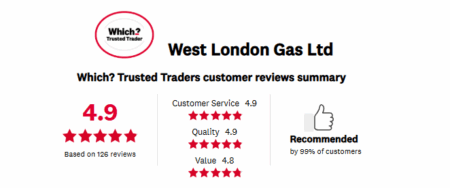That first crisp autumn morning has a certain charm, but it also serves as a stark reminder: winter is just around the corner. While we’re digging out our warmer coats, it’s easy to forget about the unsung hero of our home comfort—the central heating system. For over 25 years, homeowners across West London, from Ealing to Chiswick and Richmond, have trusted us to keep their homes warm, and we want to share some of that expertise with you.
We expect our heating to roar to life the moment we need it, but after a long summer of inactivity, your boiler and radiators can sometimes have other ideas. The last thing anyone wants is to wake up to a freezing house and the prospect of an emergency call-out. A few simple checks now can prevent boiler breakdowns and high repair bills later. Early preparation is the key to a warm and worry-free winter.
Here are five essential checks you can perform to ensure your heating system is ready for the colder months.
1. Check Your Boiler’s Pressure
Think of boiler pressure as the lifeblood of your central heating system. If it’s too low, your system won’t work efficiently, and in many cases, it won’t work at all. This is one of the most common reasons for a boiler failing to fire up.
What to do:
Locate the pressure gauge on the front of your boiler. It’s typically a circular dial with red and green zones. For most modern boilers, the ideal pressure when the system is cold should be between 1 and 1.5 bar.
If the needle has dropped into the red zone (below 1 bar), your system needs to be re-pressurised. This is often a straightforward task you can do yourself by using the filling loop attached to your boiler. Always consult your boiler’s user manual for specific instructions, as the process can vary between models.
If you find you are having to top up the pressure regularly, it could be a sign of a leak somewhere in the system. In this case, it’s crucial to call a Gas Safe registered engineer to investigate and fix the underlying problem.
2. Give Your Heating a Test Run
It might feel strange to turn the heating on while it’s still relatively mild outside, but this is one of the smartest pre-winter checks you can do. Leaving your heating system dormant for six months can lead to seized pumps and valves. A short test run helps ensure everything is moving as it should be.
What to do:
Turn your thermostat up for 15-20 minutes, long enough for the boiler to fire up and for the radiators to begin warming. Listen for any unusual noises from the boiler or pipework, such as clunking, whirring, or gurgling. These sounds can be early indicators of underlying issues.
Walk around your home and check that all the radiators are heating up. If some remain cold while others get warm, it could point to a blockage, a stuck valve, or trapped air, which brings us to our next check.
3. Bleed Your Radiators for Maximum Efficiency
Are some of your radiators cold at the top but warm at the bottom? This is a classic sign of trapped air, which prevents hot water from circulating properly and makes your system less efficient. Bleeding your radiators is a simple DIY job that can make a huge difference to your central heating system.
What to do:
First, make sure your central heating is switched off and the radiators are completely cool. You’ll need a radiator key and a cloth to catch any drips.
At the top of the radiator, you’ll find a small valve. Place the cloth underneath it, then insert the radiator key and turn it slowly anti-clockwise. You’ll hear a hissing sound as the trapped air escapes. As soon as water starts to drip out, turn the key clockwise to close the valve tightly.
Once you’ve finished, you may need to check your boiler pressure again and top it up if it has dropped. If your radiators are cold at the bottom, this could indicate a build-up of sludge, which may require a professional power flush to resolve.
4. Perform a Quick Visual Inspection
You don’t need to be an expert to spot potential trouble. A simple visual check of your boiler and the surrounding pipework can help you catch issues before they escalate.
What to do:
Look closely at the boiler casing. Are there any black, sooty marks or signs of water leaks? Check the pipework underneath for any drips. The flame in your boiler (if visible) should be a strong, crisp blue. A yellow or orange flame could indicate a problem.
It is also vital to test your carbon monoxide alarm. If you don’t have one, you should get one installed immediately. If you spot any of these warning signs, do not attempt to fix them yourself. This is a job for a qualified, Gas Safe registered engineer.
5. Book a Professional Annual Boiler Service
While the checks above are great for preventative maintenance, nothing replaces the expertise of a professional annual service. As a Which? Trusted Trader with a Feefo Platinum Trusted Service award, we know that an annual service is the single most effective way to ensure your heating system is safe, efficient, and reliable for the winter ahead. It’s also a requirement for maintaining the warranty on most new boilers and a legal necessity for landlords who need an annual Gas Safety Certificate (CP12).
During a service, a qualified engineer will perform a series of crucial checks to guarantee safety and ensure your boiler is running at peak efficiency, which can help keep your energy bills down. You can learn more and book your boiler service in West London.
Frequently Asked Questions
What should my boiler pressure be in West London homes?
For most modern combi and system boilers found in homes across West London, the ideal pressure is between 1 and 1.5 bar when the heating is off and the system is cold. You can check this on the circular pressure gauge on the front of your boiler.
Why do radiators need bleeding?
Radiators need bleeding to release trapped air that accumulates over time. This air prevents hot water from circulating to the top of the radiator, creating cold spots and making your heating system work harder to warm the room. Bleeding them ensures they heat up fully and efficiently.
How often should I service my boiler?
You should have your boiler serviced once a year by a Gas Safe registered engineer. An annual service ensures it is operating safely and efficiently, helps prevent unexpected breakdowns, and is often required to keep your manufacturer’s warranty valid.
Your Winter Comfort is Our Priority
By taking these five simple steps, you can significantly reduce the risk of a heating disaster this winter. If you’re unsure about any of these checks, need a new boiler installation, or want the complete peace of mind that comes with a professional inspection, our team of friendly, Gas Safe registered engineers is here to help.
Contact us today or give us a call if you have any questions.








